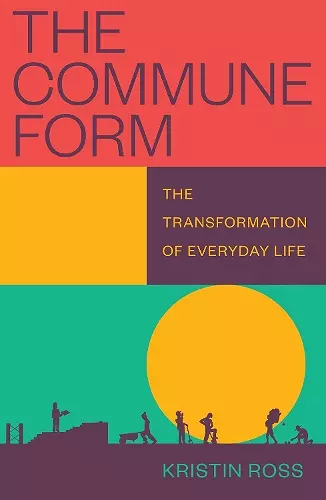The Commune Form
The Transformation of Everyday Life
Format:Paperback
Publisher:Verso Books
Published:24th Sep '24
Should be back in stock very soon

What is the Commune? A leading radical historian looks at the global resurgence of the commune and asks how they can become sites of liberation.
When the state recedes, the commune-form flourishes. This was as true in Paris in 1871 as it is now whenever ordinary people begin to manage their daily lives collectively. Contemporary struggles over land - from the zad at Notre-Dame-des-Landes to Cop City in Atlanta, from the pipeline battles in Canada to Soulèvements de la terre - have reinvented practices of appropriating lived space and time. This transforms dramatically our perception of the recent past.
Rural struggles of the 1960s and 70s, like the "Nantes Commune," the Larzac, and Sanrizuka in Japan, appear now as the defining battles of our era. In the defense of threatened territories against all manners of privatization, hoarding, and infrastructures of disaster, new ways of producing and inhabiting are devised that side-step the state and that give rise to unprecedented kinds of solidarity built on pleasurable, fruitful collaborations. These are the crucial elements in the present-day reworking of an archaic form: the commune-form that Marx once called "the political form of social emancipation," and that Kropotkin deemed "the necessary setting for revolution and the means of bringing it about."
Tracing a genealogy of the commune form from 1871, via Henri Lefebvre, to contemporary agrarian struggles of defence, Kristin Ross teases out a conceptual lexicon for ecological spaces 'beyond capitalism and beyond state bureaucracy'. An essential book. -- Steve Edwards, author of Martha Rosler
Far from being a remnant surviving in the entrails of modernity, the paysan takes center stage in Ross's remarkable book as the guide to our post-capitalist futures. Her commentary on recent conflicts between land-based movements and state power is as profound as her appreciation of the modern communards who are reinventing how we should live on the earth. -- Andrew Ross, author of Stone Men: The Palestinians Who Built Israel
Continuing a discourse on the commons begun with Communal Luxury and developed in the introduction to The Zad and NoTAV, Kristin Ross' The Commune Form is a most insightful account of the making of a revolutionary process staring form the transformation of everyday life. It is an account that connects past and present, shows the power of the struggle for the defense of the and land and its capacity to mobilize diverse social subjects and create new social relations. The Commune Form is also an excursus through the theorization about the construction of communal life from Marx and Kropotkin to Mies and (especially) Lefebvre. Beautifully written, at a time when we often despair of the future, it is powerful, soul-moving affirmation that another world free from the alienation of life in capitalism is not only possible but in the making. -- Silvia Federici, author of Caliban and the Witch
In this valuable and stimulating essay, Ross turns her attention to the long history of the Paris Commune, seeking its legacy in the making of contemporary struggles over land in the face of state and corporate infrastructure projects. Taking the practices of communal living as her starting point, she argues that 'we make our community by defending it', and shows how territorial defence can provide a model for building solidarities and developing the alternative ways of living, being and doing that will be central to a post-productionist world. -- Graeme Hayes, author of Breaking Laws: Violence and Civil Disobedience in Protest
The Commune Form is not determined by disputes on the Marxological left. Its voice is refreshing, precisely because it is so unencumbered by this superego. -- Kevin Duong * Public Books *
[N]othing about Ross' subject matter could be called simple-each instantiation of the commune form brings with it a new host of social problems-but her project is to locate the deeper simplicity in what appears infinitely complex. -- Patrick Lyons * Parapraxis *
ISBN: 9781804295311
Dimensions: 198mm x 129mm x 9mm
Weight: 122g
144 pages
Paperback original